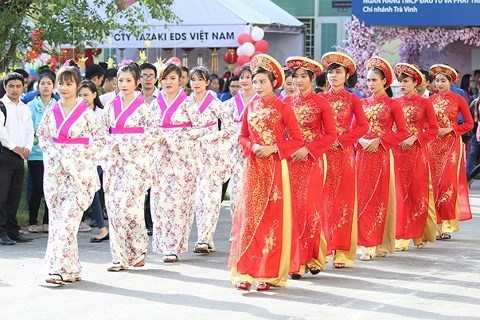
The People’s Committee of the southern province of Tra Vinh on October 25 organised a cultural exchange programme to tighten the friendship between Vietnam and Japan.

The Vietnam-Japan Cultural Exchange Programme 2018 is organised
to tighten the friendship between Vietnam and Japan. (Photo:
travinh.gov.vn)
The Vietnam-Japan Cultural Exchange Programme 2018 was attended by
Jun-ichi Kawaue, Japanese Consul General to Ho Chi Minh City, and a crowd of
Japanese businesses based in the city and Tra Vinh province.
In his opening remark, Chairman of the provincial People’s Committee Dong Van
Lam said the programme is held to celebrate the 45th anniversary of
Vietnam-Japan diplomatic ties (September 21, 1973-2018).
Through the exchange, Tra Vinh wishes to introduce the Japanese people to the
cultural beauties and traditional customs of Vietnam in general and the
province in particular, he said.
The local leader took the occasion to thank the Japanese Government for funding
many programmes and projects in Tra Vinh over the past time. Among them are a
specialised credit programme, a project to improve agricultural promotion
system and another on medical equipment supply, which contribute to giving a
facelift to the province’s extremely difficult rural areas.
For his part, the Japanese Consul General lauded the fine friendship between
the two countries and expressed his wish that Vietnam-Japan exchange will be
expanded to many other fields so that Japanese businesses have more conditions
to explore investment opportunities in the locality.
The Vietnam-Japan Cultural Exchange Programme 2018 featured a wide range of
activities, including performances of traditional instruments, folk games,
re-enactment of a countryside market day, kimono and ao dai (long dress) shows,
and Japanese dance performances.
Japanese and Vietnamese handicrafts and cuisine were also introduced at the
event.
Source: VNA
With an increasingly vibrant and widespread emulation movement aimed at building cultured residential areas and cultured families, Yen Thuy District has been making steady progress toward improving both the material and spiritual well-being of its people, while fostering a civilized, prosperous, beautiful, and progressive community.
Once lacking recreational spaces and community facilities, Residential Group 2 in Quynh Lam Ward (Hoa Binh City) has recently received attention for the construction of a new, spacious, and fully equipped cultural house. The project followed the model of state support combined with public contributions in both labor and funding.
The "All people unite to build cultural life" movement, which has been effectively integrated with Kim Boi district’s socio-economic development goals, is fostering a lively spirit of emulation across local residential areas, hamlets, villages, public agencies, and enterprises. In addition, through the initiative, traditional cultural values are being preserved and promoted, while community solidarity and mutual support in poverty reduction and economic development are being strengthened.
A working delegation of the Hoa Binh provincial People’s Committee led by its Permanent Vice Chairman Nguyen Van Toan on June 11 inspected the progress of a project to build the Mo Muong Cultural Heritage Conservation Space linked to tourism services in Hop Phong commune, Cao Phong district.
Born and growing in the heroic land of Muong Dong, Dinh Thi Kieu Dung, a resident in Bo town of Kim Boi district, in her childhood was nurtured by the sweet lullabies of her grandmother and mother. These melodies deeply imprinted on her soul, becoming an inseparable part of her love for her ethnic group's culture. For over 20 years, this love for her hometown has driven Dung to research, collect, and pass down the cultural values of the Muong people to future generations.
In the final days of May, the Ethnic Art Troupe of Hoa Binh Province organized performances to serve the people in remote, mountainous, and particularly disadvantaged areas within the province. These were not just ordinary artistic shows, but they were the meaningful journeys aimed at spreading cultural values, enhancing the spiritual life of the people and contributing to the preservation of ethnic minority cultural identities.



